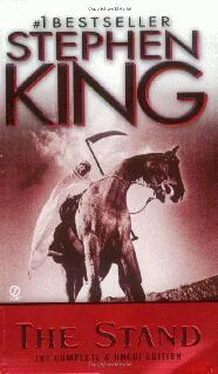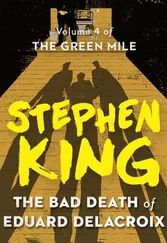In the row behind Larry, a man was coughing.
There was a grandfather clock standing in the far corner of the parlor. Frannie Goldsmith had been listening to its measured ticks and tocks all of her life. It summed up the room, which she had never liked and, on days like today, actively hated.
Her favorite room in the place was her father’s workshop. It was in the shed that connected house and barn. You got there through a small door which was barely five feet high and nearly hidden behind the old kitchen woodstove. The door was good to begin with: small and almost hidden, it was deliciously like the sort of door one encountered in fairy-tales and fantasies. When she grew older and taller, she had to duck through it just as her father did—her mother never went out into the workshop unless she absolutely had to. It was an Alice in Wonderland door, and for a while her pretend game, secret even from her father, was that one day when she opened it, she would not find Peter Goldsmith’s workshop at all. Instead she would find an underground passageway leading somehow from Wonderland to Hobbiton, a low but somehow cozy tunnel with rounded earthen sides and an earthen ceiling interlaced with sturdy roots that would give your head a good bump if you knocked it against any of them. A tunnel that smelled not of wet soil and damp and nasty bugs and worms, but one which smelled of cinnamon and baking apple pies, one which ended somewhere up ahead in the pantry of Bag End, where Mr. Bilbo Baggins was celebrating his eleventy-first birthday party…
Well, that cozy tunnel never turned out to be there, but to the Frannie Goldsmith who had grown up in this house, the workshop (sometimes called “the toolshop” by her father and “that dirty place where your dad goes to drink beer” by her mother) had been enough. Strange, tools and odd gadgets. A huge chest with a thousand drawers, each of the thousand crammed full. Nails, screws, bits, sandpaper (of three kinds: rough, rougher, and roughest), planes, levels, and all the other things she’d had no name for then and still had no name for. It was dark in the workshop except for the cobwebby forty-watt bulb that hung down by its cord and the bright circle of light from the Tensor lamp that was always focused where her father was working. There were the smells of dust and oil and pipesmoke, and it seemed to her now that there should be a rule: every father must smoke. Pipe cigar, cigarette, marijuana, hash, lettuce leaves, something . Because the smell of smoke seemed an integral part of her own childhood.
“ Hand me that wrench, Frannie. No—the little one. What did you do at school today?… She did?… Well why would Ruthie Sears want to push you down?… Yes, it is nasty: Very nasty scrape. But it goes good with the color of your dress, don’t you think? Now if you could only find Ruthie Sears and get her to push you down again and scrape the other leg. Then you’d have a pair. Hand me that big screwdriver, would you?… No, the one with the yellow handle .”
“ Frannie Goldsmith! You come out of that nasty place right now and change your schoolclothes! RIGHT… NOW! You’ll be filthy! ”
Even now, at twenty-one, she could duck through that doorway and stand between his worktable and the old Ben Franklin stove that gave out such stuperous heat in the wintertime and catch some of what it had felt like to be such a small Frannie Goldsmith growing up in this house. It was an illusory feeling, almost always intermingled with sadness for her barely remembered brother Fred, whose own growing-up had been so rudely and finally interrupted. She could stand and smell the oil that was rubbed into everything, the must, the faint odor of her father’s pipe. She could rarely remember what it had been like to be so small, so strangely small, but out there she sometimes could, and it was a glad way to feel.
But the parlor, now.
The parlor.
If the workshop was the goodness of childhood, symbolized by the phantom smell of her father’s pipe (he sometimes puffed smoke gently into her ear when she had an earache, always after extracting a promise that she wouldn’t tell Carla, who would have had a fit), then the parlor was everything in childhood you wished you could forget. Speak when spoken to! Easier to break it than to fix it! Go right upstairs this minute and change your clothes, don’t you know that isn’t suitable? Don’t you ever think? Frannie, don’t pick at your clothes, people will think you have fleas. What must your Uncle Andrew and Aunt Carlene think? You embarrassed me half to death! The parlor was where you were tongue-tied, the parlor was where you itched and couldn’t scratch, the parlor was dictatorial commands, boring conversation, relatives pinching cheeks, aches, sneezes that couldn’t be sneezed, coughs that couldn’t be coughed, and above all, yawns that must not be yawned.
At the center of this room where her mother’s spirit dwelt was the clock. It had been built in 1889 by Carla’s grandfather, Tobias Downes, and it had ascended to family heirloom status almost immediately, shifting down through the years, carefully packed and insured for moves from one part of the country to another (it had originally come into being in the Buffalo, New York, workshop of Tobias, a place which had undoubtedly been every bit as smoky and nasty as Peter’s workshop, although such a comment would have struck Carla as completely irrelevant), sometimes shifting from one section of the family to another when cancer, heart attack, or accident pinched off some branch of the family tree. The clock had been in this parlor since Peter and Carla Goldsmith moved into the house some thirty-six years ago. Here it had been placed and here it had stayed, ticking and tocking, marking off segments of time in a dry age. Someday the clock would be hers, if she wanted, Frannie reflected as she looked into her mother’s white, shocked face. But I don’t want it! Don’t want it and won’t have it!
In this room there were dried flowers under glass bells. There was in this room a dove gray carpet with dusky pink roses figured into the nap. There was a graceful bow window that looked down the hill to Route 1, with a big privet hedge between the road and the grounds. Carla had nagged her husband with a grim fervor until he planted that hedge right after the Exxon station on the corner went up. Once it was in, she nagged her husband to make it grow faster. Even radioactive fertilizer, Frannie thought, would have been acceptable to her if it had served that end. The stridency of her remonstrations concerning the privet had lessened as the hedge grew taller, and she supposed it would stop altogether in another two years or so, when the hedge finally grew tall enough to blot out the offending gas station completely and the parlor was inviolate again.
It would stop on that subject, at least.
Stencils on the wallpaper, large green leaves and pink flowers almost the same shade as the roses in the carpet. Early American furniture and a dark mahogany set of double doors. A fireplace which was just for show where a birch log sat eternally on a hearth of red brick which was eternally immaculate and untouched by even a speck of soot. Frannie guessed that by now that log was so dry that it would burn like newspaper if lit. Above the log was a pot almost big enough for a child to bathe in. It had been handed down from Frannie’s great-grandmother, and it hung eternally suspended over the eternal log. Above the mantel, finishing that part of the picture, was The Eternal Flintlock Rifle.
Segments of time in a dry age.
One of her earliest memories was of peeing on the dove gray rug with the dusky pink roses figured into the nap. She might have been three, not trained for very long, and probably not allowed in the parlor save for special occasions because of the chance of accidents. But somehow she had gotten in, and seeing her mother not just running but sprinting to grab her up before the unthinkable could happen had brought the unthinkable on. Her bladder let go, and the spreading stain as the dove gray rug turned to a darker slate gray around her bottom had caused her mother to actually shriek. The stain had finally come out, but after how many patient shampooings? The Lord might know; Frannie Goldsmith did not.
Читать дальше












